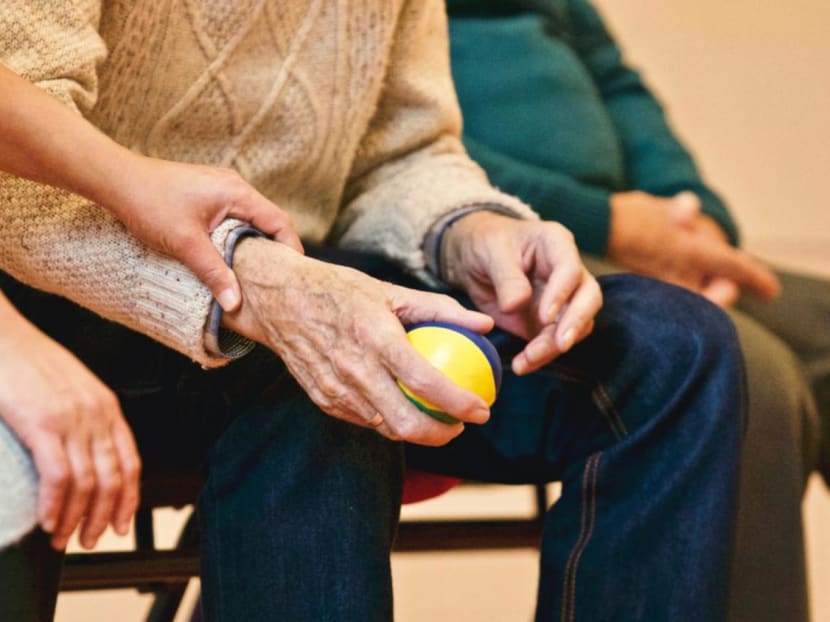Pay raise cold comfort for abuse that comes with job, say social workers; association urges more protection
SINGAPORE — There was once when she saw some children being physically abused by their parents and so Winnie, a social worker, called child protection services to take the kids to safety.

- Last month, the Ministry of Social and Family Development raised its salary guidelines for social workers
- However, some social workers said that any pay increase would be cold comfort for the abuse they face from clients
- For them, it's part of the job as they have to deal with families with financial difficulties and a host of other issues
- Ms Tan Sze Wee, president of the Singapore Association of Social Workers, said that more measures should be put in place to protect them
SINGAPORE — There was once when she saw some children being physically abused by their parents and so Winnie, a social worker, called child protection services to take the kids to safety.
It only made the parents angrier.
“The parents threatened to harm me for taking their children away after I had seen (the children) being harmed,” said Winnie.
“They were defensive and they made rather veiled threats like ‘I’ve been to jail before, I'm not afraid’, and ‘I know where you work’.”
While social workers like her say that in their line of work, dealing with abuse and harassment is all par for the course and so they try not to get too affected, some cases do stick.
“You’ll definitely be affected when you receive a threat, especially during our house visits when we are in their homes,” said Winnie.
Threats aside, social workers also get hit, harassed or cursed at by clients who were upset about being ineligible for financial aid.
“It has always been like this, it's just part of the job,” said Samantha, a medical social worker who has been in the sector for two years.
They get it outside of work, too, with some receiving vulgar text messages on their rest days.
The Ministry of Social and Family Development (MSF) has designated 2023 as its "Year of Celebrating Social Service Partners" to recognise the contributions of individuals and groups in the social service sector.
The ministry also raised its salary guidelines for social workers.
While this does not necessarily mean social workers will get a pay bump — social agencies are not obliged to follow the guidelines — workers said that a pay hike would be cold comfort.
“There may be an increase in pay, but you can earn that money elsewhere without having to deal with the abuse,” said Samantha.
The social workers who spoke to TODAY were given pseudonyms as they had requested anonymity to protect her clients’ identities.
Ms Tan Sze Wee, the president of the Singapore Association of Social Workers (SASW), said that while organisations may have measures to keep their workers safe, more could be done by the Government and social service agencies.
This includes introducing regulations that could act as a deterrence to abusive behaviour, and for social service agencies to set in place clear protocols to provide a safe working environment for their workers.
TAKING OUT THEIR ANGER ON SOCIAL WORKERS
For social worker Hani, it’s also due to the nature of the job.
Social workers usually deal with lower-income households or families with financial difficulties and a host of other issues.
“Working in this line means getting thrown into people’s problems. Clients come to you with needs and it can be overwhelming and mentally draining to absorb all that,” said Ms Hani.
Samantha understands that the abusive ones are “just frustrated that they are not eligible for aid, that they fall through the cracks”.
But it’s still exhausting being the person who has to bear the brunt of the anger, she said.
“Vulgarities are common, and sometimes they’ll scold you for not being helpful or professional enough even when there’s nothing more we can do.”
She had also come across people who threaten to skip important doctor appointments and surgeries because they cannot get financial aid.
“It can cause quite a lot of anxiety because you feel like their life is impacted by you,” said Samantha.
Hani recalled a female client who had mental health issues and was verbally abusive towards her.
“I had to mentally detach myself from the situation because if I was actually listening to her, I would have been very distraught,” said the 22-year-old.
“My colleagues would always remind me that if clients blow up at you, it’s not a reflection of your work, rather something that they are dealing with.”
Kimberly, another social worker, deals with youths mostly in primary and secondary school. Some youths may struggle to express their emotions and hence display abusive behaviour.
“But we do get into a bit more dangerous situations at times when the child, perhaps with special needs, may not know how to express themselves well,” she said.
But she also bears the brunt of parents who may be upset that their children are not improving as quickly as they like.
“They will take their anger out on us, scolding us and calling us unprofessional,” said Kimberly.
While being in the line of fire is something she knew she signed up for when she joined the sector, she admits that it is still “very stressful”.
Not all clients are hostile, and in fact, most are appreciative of their work as social workers, Hani said.
But the constant exposure to challenging cases and abuse from some clients does take a toll on the mental health of social workers, often leading to burnout.
Winnie said that social workers could mitigate the risk of harm by going for home visits with a colleague, but it does eat into the time needed to clear their heavy workloads.
‘SOCIAL WORKERS AT HIGH RISK OF ABUSE AND HARASSMENT’: ASSOCIATION
SASW’s Ms Tan said that social workers, just like other frontline workers, are at risk of being subjected to harassment and abuse.
This is due to the fact that they work with people who are experiencing significant challenges and stress, who may express themselves through abusive behaviour such as shouting or threatening social workers.
“There are various measures in the sector and organisations to ensure the safety of social workers,” said Ms Tan.
These measures include installing closed-circuit television at social services premises and specialised training for social workers to manage situations with risk and safety concerns.
SASW is currently piloting a training in social work supervision.
Ms Tan added: “Supervision is one of the key measures that ensure the safety of both social workers and clients through regularly assessing risks and identifying red flags to ensure safe and responsive practice.”
In response to queries, MSF said that frontline workers do face clients with issues of aggression occasionally, which can be distressing for social service professionals "as they care deeply for clients and empathise with their complex circumstances and issues".
However, the number of reports it receives regarding abuse towards social workers has "consistently been small" and abuse is not a top issue cited by social workers in the ministry's engagement efforts.
"Nevertheless, MSF takes a firm stance against abuse and does not condone egregious behaviour towards social service professionals," said MSF.
"MSF assures social service professionals that cases of abuse they encounter that are reported to the authorities will be acted upon."
The ministry called on social service agencies to ensure their staff's safety, including having clear policies and safety protocols in place and filing for protection under the Protection from Harassment Act.
It also asked members of the public to support social service professionals by "showing respect and recognition to our professionals".
Samantha suggested that agencies should enhance training for social workers to better manage their clients’ expectations.
She also believes that more could be done by the Government to educate people on the different financial aid schemes and their requirements.
“If people knew from the start that there are requirements to be met to get aid, they may not be as frustrated when we are trying to help them,” she said.













